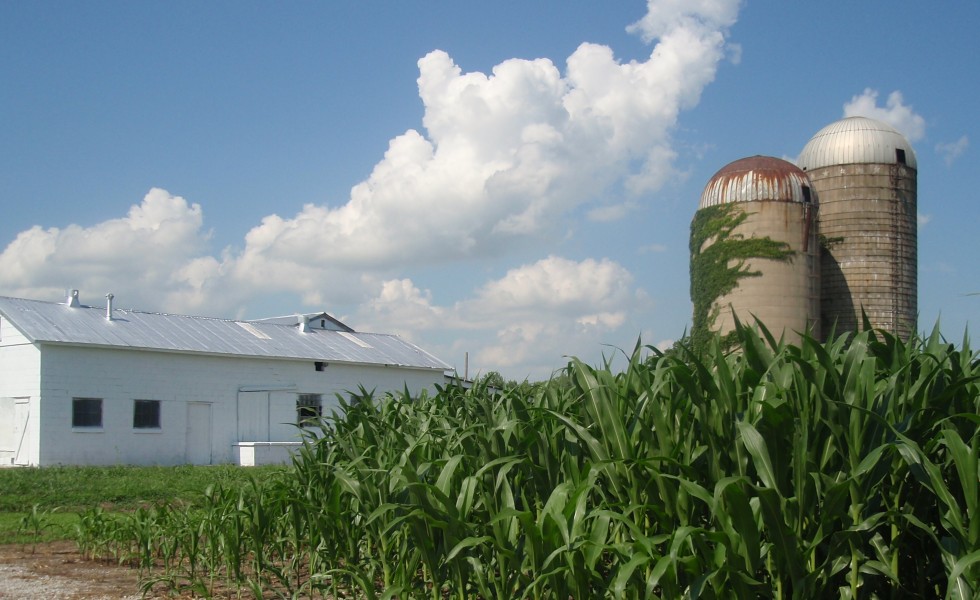The Measured Steps of a Steady Man
Posted on August 30, 2018

Cool, foggy August mornings like today inevitably carry the 50-year-old sounds of the milking parlor where my father and herdsman Howard spent tens of thousands of hours together over nearly four decades.
The pair—one a college near-graduate, the other an eighth-grade graduate of the schoolhouse you could see from the dairy barn—rarely spoke. They fulfilled their milking tasks more with a series of nods than a string of words or sentences.
The principle sound I hear on these quiet, late summer mornings comes from the parlor radio, tuned to “Total Information” KMOX, St. Louis, delivering the daily news: more American GI deaths in Vietnam, hotter temperatures expected later in the day, Cardinal pitcher Bob Gibson throws another shutout gem.
The newsman’s voice rings clear over the drumming thrum of the vacuum pumps and milk-cooling compressor that announce to anyone within a half-mile that there’s serious work going on here.
It’s that sound, the sound of steady people doing steady work in a very unsteady world, that I often miss about the southern Illinois dairy farm of my youth. My dad’s steadiness. Howard’s steadiness. The steady sound of those compressors, that radio, August farm life. All were powered by some invisible current that rarely wavered in flow or direction.
I think my father’s steadiness came from his mother, not his father. Grandpa was a bond broker who drove to St. Louis everyday to take on the world; Grandma was a self-esteem broker who lived to make her grandchildren happy. When we stayed at their house, she taught us canasta, made root beer floats every evening, and let us watch television in the middle of the afternoon. Grandpa scowled.
My father rarely scowled. In fact, he was the person the church turned to chair an important fund drive to add four classrooms to its elementary school, the farmer the county asked to serve on its radically new “planning commission,” the honest broker the dairy coop needed on its board to burnish its integrity and fairness.
Dad was just as steady in his daily routine. Everyday except Sunday, his day off, he was in the dairy barn at 5:30 am, home at 8 for breakfast, in the field until noon dinner followed by a nap until 1 pm, then back to the field until “lunch” and milking at 4. Supper came after the evening milking, usually around 7:15.
That schedule varied little from 1953 through 1995.
His work uniform was equally unvaried. In the summer it featured leather work shoes, a white T-shirt, blue overalls, a handkerchief, a seed corn hat, and a pocketknife. Winter just brought more layers and coveralls. At milking time, Dad wore slip-on boots; light ones in the summer, insulated ones in the winter.
Even more remarkable was that while I spent almost every summer day and most school year evenings and weekends with my father, we rarely talked. Oftentimes, someone—my siblings, Mom, hired men, Grandpa, Uncle Honey—was around to discourage it. Other times he just went about his work in focused silence.
As such, I became more an observer of his life than a participant. That wasn’t a conscious choice on my part but I suspect it might have been on his. Life isn’t complicated if you don’t complicate it. Dad didn’t.
His death was similarly uncomplicated. Neither illness nor accident claimed him two years ago during a brief stay in a St. Louis hospital. He simply wore out; 89 years, spent mostly on the farm, had simply emptied him.
I was holding his slender hand that early evening as he stirred and turned his gray eyes to me. They carried a question and his long stare finally caused me to say, “It’s OK, Dad, I got this. I got it.” At that he took three shallow breaths and passed into the heart of his deepest, most faithful belief.
It was like most of our conversations: brief, direct, consequential. And it, too, will now be part of what I hear on August mornings like today.
© 2018 ag comm
Share This